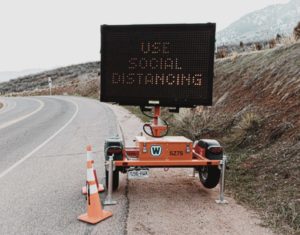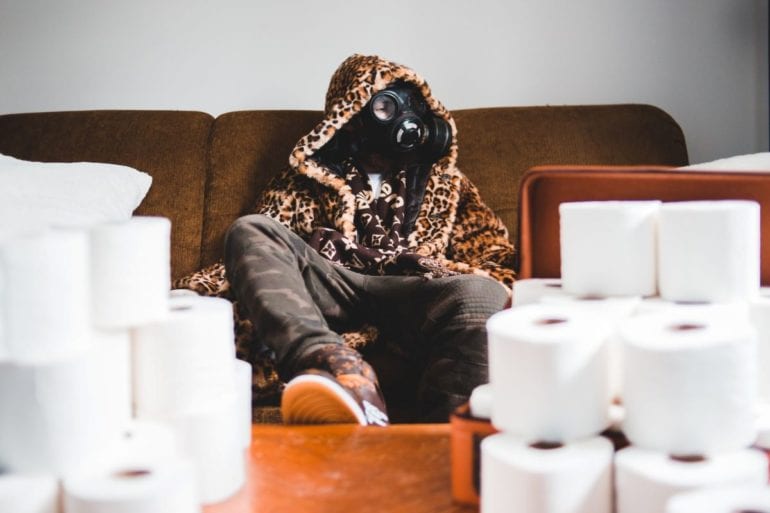
Twenty years from now, what will you remember about the COVID-19 Pandemic?
Will you remember the students who were forced to finish out their school year at home or the seniors who were not able to participate in graduations?
Or the difficult time many people had with working from home?
Maybe the long lines of people waiting to purchase toilet paper?
Will you remember how social distancing and quarantine contributed to slowing the spread of the disease?
Professor Steven Taylor, Ph.D., Clinical Psychologist in the Department of Psychiatry at the University of British Columbia, recently published “The Psychology of Pandemics: Preparing for the Next Global Outbreak of Infectious Disease.” In his ‘timely’ text, Dr. Taylor spoke of how pandemics are as much a psychological problem as a medical one.
In Dr. Taylor’s text, he highlights how human behavior contributes to the spread of disease. Our behavior is influenced by what we think about the information we are receiving from the media and our social networks. Whether or not we follow the proposed public health recommendations offered to slow the rate of infection from the coronavirus is in part determined by whether w e trust the information we receive or the source from where it comes. Thus, psychological reactions to the threat of infection play an essential role both in the spreading and containment of the disease.
e trust the information we receive or the source from where it comes. Thus, psychological reactions to the threat of infection play an essential role both in the spreading and containment of the disease.
In addition to how we view our risk for disease, we also make assumptions about the state of a crisis based on information we receive from news and social media. How information is presented as well as the frequency of that information has contributed to “panic-buying.” After hearing on the news that there is a “shortage” of toilet paper and seeing images of empty shelves in the stores, people began buying toilet paper in bulk.
Although accurate information is often provided about how best to slow the spread of the disease, some individuals are reluctant to follow the associated recommendations. Our compliance is shaped by the media (including social media) and our health belief system.
Dr. Gordon J.G. Asmundson and Dr. Steven Taylor, authored a recent online editorial in the Journal of Anxiety Disorders, addressing how  “psychological factors are known to play a vital role in the success of public health strategies used to manage epidemics and pandemics.” Whether an individual believes the public health information they receive, gets vaccinated, engages in good hygiene practices, or follows recommendations for social distancing is dependent upon their health anxiety.
“psychological factors are known to play a vital role in the success of public health strategies used to manage epidemics and pandemics.” Whether an individual believes the public health information they receive, gets vaccinated, engages in good hygiene practices, or follows recommendations for social distancing is dependent upon their health anxiety.
Health anxiety is described as falling on a continuum from those who fear that any bodily sensation or change is a symptom of an underlying illness (high health anxiety) to those who believe that they are not at risk (low health anxiety) and choose not to follow precautions or modify their behaviors.
As we continue to social distance and shelter-in-place, let us remember to seek information from authoritative sources, such as the World Health Organization (WHO) and the Centers for Disease Control and Prevention (CDC). Remember to engage in behaviors that slow the spread of disease, and engage in a range of self-care activities, such as limiting the amount of time you spend gathering information, that will allow you to be creative, relax, exercise, socialize (in small groups or virtually. Most importantly, follow the guidelines set forth by your local and state government, clear your mind, and spend quiet time alone.
References:
Asmundon, G.J.G., & Taylor, S. (March 10, 2020). How health anxiety influences responses to viral outbreaks like COVID-19: What all decision-makers, health authorities, and health care professionals need to know: Journal of Anxiety Disorders, 71, 102211
Centers for Disease Control and Prevention
Labott, S. M. (2019). Health Psychology Consultation in the Inpatient Medical Setting. Washington, DC: American Psychological Association.
Taylor, S. (2019). The Psychology of Pandemics: Preparing for the Next Global Outbreak of Infectious Disease. Newcastle upon Tyne: Cambridge Scholars Press.
Weir, K. (March 16, 2020). Seven crucial research findings that can help people deal with COVID-19.
Dr. Teresa Collins-Jones is the department chair of the Clinical Psychology Program at The Chicago School’s Dallas Campus.
Learn more about The Chicago School of Professional Psychology
Complete the form below to request more information about The Chicago School and the academic programs we offer.

